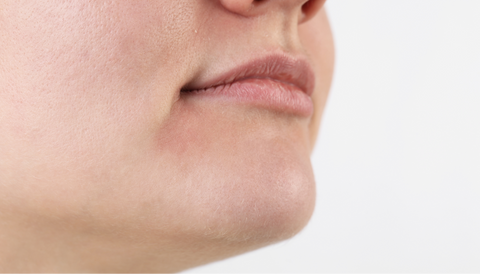Dry Skin Vs Dehydrated Skin: Know The Difference & Get Relief
Healthy skin is more than just a pretty face; it's our body's first line of defense against the outside world. It keeps us hydrated, regulates temperature, and protects us from harmful elements. Yet, many of us struggle with dryness, a frustrating issue that can leave skin feeling tight, flaky, and dull. But is it truly dry skin, or could it be dehydration?
Understanding the difference between dry skin vs dehydrated skin is key to achieving a healthy, radiant complexion. This Japan With Love post will clear up the confusion and help you tell if your skin is dry or dehydrated, so you can finally find the relief you deserve.
1. Understanding dry skin: A skin type craving moisture
Japanese skincare routines focus heavily on preventing problems before they arise. This includes protecting the skin from sun damage, maintaining a high level of hydration, and using products that support the skin’s natural barrier, this is especially important for dry skin. Dry skin isn't just a passing phase; it's a skin type characterized by a lack of natural oils. Our skin produces sebum, a waxy substance that helps lock in moisture and keep it supple. However, some people simply produce less sebum, making their skin more prone to dryness.
This lack of oil can manifest in several uncomfortable ways. Dry skin often feels tight and uncomfortable, especially after cleansing or showering. It can become flaky and develop itchy patches. The texture can feel rough and uneven, lacking the smooth, plump appearance of well-hydrated skin.

Dry skin: Tight, flaky, and lacking moisture, it craves hydration and nourishment
Several factors can contribute to dry skin. Genetics play a role, with some people naturally predisposed to producing less sebum. Climate can also be a culprit, as dry, cold winters or hot, sunny summers can deplete the skin's moisture. Even our daily habits can influence dryness. Hot showers and harsh soaps can strip away natural oils, leaving skin feeling even tighter.
2. Understanding dehydrated skin: When your skin thirsts for water
Dehydrated skin, unlike dry skin, is not a permanent skin type, but rather a temporary skin condition. It occurs when the skin loses too much water, leaving it parched and lacking its natural plumpness.
While dry skin lacks oil, dehydrated skin lacks water content. This vital component plays a crucial role in maintaining the skin's structure and keeping it looking healthy. When dehydrated, the skin can appear dull and lacklustre. Fine lines may become more noticeable, and the overall texture may feel temporarily tight or dry.

Dehydration can be triggered by various external factors. Excessive sun exposure draws water away from the skin. Dry climates with low humidity can also contribute. Additionally, certain lifestyle habits can deplete the skin's water content. Caffeine and diuretics, for example, are known to increase urination, which can lead to dehydration throughout the body, including the skin.
3. What is the difference between dry skin and dehydrated skin?
While both dry and dehydrated skin can leave your face feeling uncomfortable, the root causes and solutions differ. This table breaks down the key distinctions between dry skin vs dehydrated skin:
|
Feature |
Dry Skin |
Dehydrated Skin |
|
Cause |
Lack of natural oil production (sebum) |
Lack of water content in the skin |
|
Symptoms |
Tightness, flaking, itchiness, rough texture |
Dullness, fine lines, temporary dryness |
|
Persistence |
Chronic skin type |
Temporary condition |
|
Examples of Triggers |
Genetics, climate, hot showers, harsh soaps |
Sun exposure, dry climate, caffeine, diuretics |
Ready to unveil your skin's radiant potential? Explore our newest blog about Honey Skincare to see the benefits of honey for the ski.
4. How to tell if your skin is dry or dehydrated
So, how do you determine if your skin is truly dry or simply dehydrated? A simple at-home test can offer some clues:
- The pinch test: Gently pinch a small area of skin on your cheek or the back of your hand and hold for a few seconds. Then, release. If the skin snaps back quickly (within 2-3 seconds), your skin is likely well-hydrated. However, if it takes several seconds for the skin to return to its original position, dehydration could be at play.

The pinch test helps distinguish dry skin vs dehydrated skin by assessing elasticity
This test provides a basic indication, but it's not foolproof. Here are some additional factors to consider:
- Overall skin type: Do you typically experience persistent dryness, even in humid climates? This suggests dry skin. However, if you generally have oily or combination skin but experience occasional tightness, especially after sun exposure or travel, dehydration might be the culprit.
- Presence of other symptoms: Dry skin often comes with a constellation of symptoms beyond just tightness. Look for flaking, itchiness, and rough texture. Dehydrated skin, on the other hand, may present with dullness, fine lines, and a slightly ashy appearance.
Have you ever wondered if there's a secret weapon in Japanese or Korean skincare that could be the missing piece for your dry or dehydrated skin? Both offer unique philosophies and hero ingredients.
Dive deeper into our blog to explore the world of Japanese vs Korean skincare and discover which approach might be the perfect fit for you!
5. Relief for dry and dehydrated skin: Quenching your skin's thirst
The good news is, regardless of whether your skin is dry or dehydrated, there are steps you can take to find relief and achieve a healthy, hydrated complexion. Here are some key strategies:
- Hydrate from the inside out: Drinking plenty of water throughout the day is crucial for overall health, and your skin is no exception. Aim for eight glasses of water daily to keep your skin plump and hydrated from within.
- Cleanse gently: Harsh soaps and cleansers can strip away natural oils and exacerbate dryness. Opt for gentle, fragrance-free cleansers that won't disrupt your skin's delicate barrier.
- Moisturize regularly: This is a non-negotiable step for both dry and dehydrated skin. Moisturizers help trap water in the skin and prevent further moisture loss. In addition to a daily moisturizer, consider incorporating a hydrating mask a few times a week for an extra moisture boost.
The VT Cica Vital Mask is a popular choice for dry skin, formulated with centella asiatica extract (cica) for soothing and hyaluronic acid for deep hydration.

However, the type of moisturizer you choose, and whether you consider a BB cream, can make all the difference:
- Dry skin: For dry skin that craves extra nourishment, opt for oil-based moisturizers or look for a BB cream specifically formulated for dry skin. These BB creams provide a richer, more occlusive layer that helps lock in moisture and prevent evaporation, often containing beneficial ingredients. Additionally, ingredients like humectants (attract water) can further boost hydration.
Choosing the best BB cream for dry skin will not only even out your skin tone but also provide much-needed moisture throughout the day.
- Dehydrated skin: Dehydrated skin needs a moisture surge. Look for formulas with hyaluronic acid, a powerful humectant that draws water from the deeper layers of the skin and plumps it up. Water-based moisturizers are also a good choice for dehydrated skin, as they feel lightweight and absorb quickly.
By incorporating these practices into your routine, you can give your skin the care it needs to feel and look its best.
6. FAQs
6.1. Can I have both dry and dehydrated skin?
Absolutely! While dry and dehydrated skin are distinct conditions, they can sometimes coexist. For example, someone with naturally dry skin (due to low sebum production) can also experience occasional dehydration from external factors like sun exposure or travel.
If you suspect you have both concerns, focus on a balanced approach. Use a gentle cleanser and incorporate a combination of oil-based and water-based moisturizers throughout the day. Hyaluronic acid serums can also be a great addition to your routine to provide an extra boost of hydration.

It's possible to have both dry and dehydrated skin
6.2. What ingredients should I avoid?
Both dry and dehydrated skin benefit from a gentle approach. Here are some ingredients to avoid:
- Harsh sulfates: These cleansing agents can strip away natural oils and exacerbate dryness.
- Alcohol: Drying and irritating, alcohol can disrupt the skin's barrier function.
- Fragrance: While not inherently harmful, fragrance can irritate sensitive skin. Opt for fragrance-free products whenever possible.
7. Wrap it up
Dry skin vs dehydrated skin, while often confused, are distinct concerns with different solutions. By understanding these differences, you can finally achieve the healthy, hydrated complexion you deserve.
Implement the tips outlined above, like staying hydrated, using gentle cleansers, and moisturizing regularly. Choose the right moisturizer for your needs, and don't hesitate to consult a dermatologist for personalized advice. With the right approach, you can unveil your skin's true radiance and feel confident in your healthy glow.
Follow Japan With Love for more tips and updates on beauty products that will take your skincare routine to the next level.

Dejar un comentario